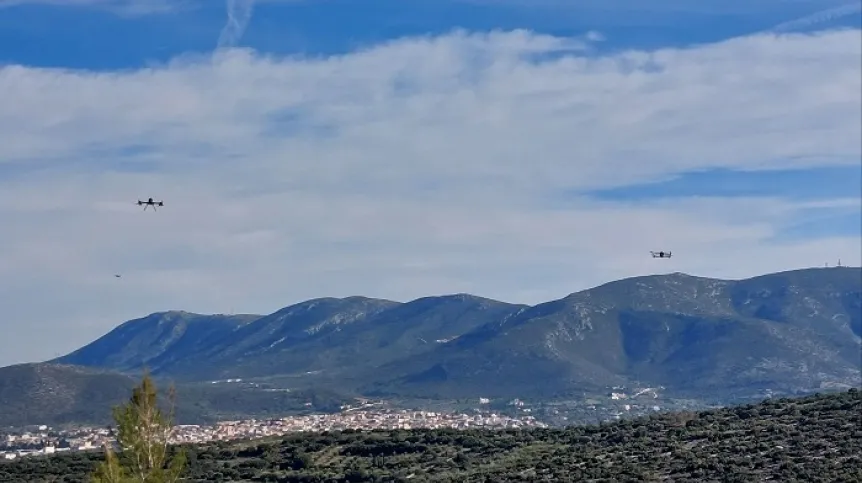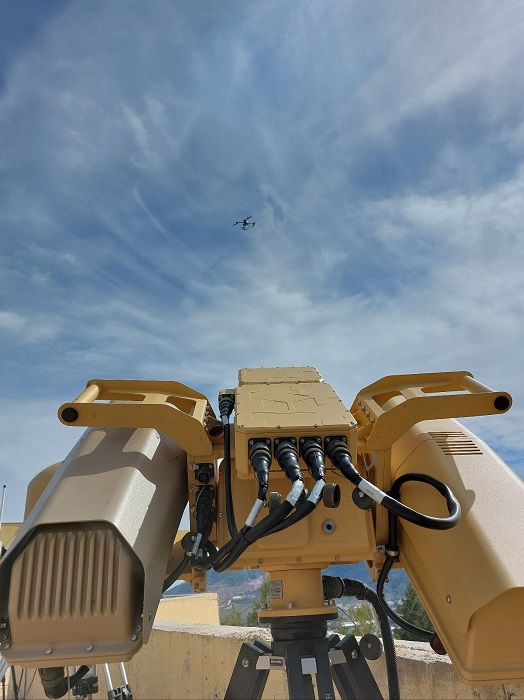
Polish optoelectronics engineers have co-created criteria for testing and selecting anti-drone technologies to protect infrastructure, borders and residents of individual EU countries.
The European Commission recognized the COURAGEOUS Project with the participation of the Military University of Technology as the main pillar of its policy on countering the potential threats from non-cooperative unmanned aircraft systems.
Drones - relatively cheap, simple and widely available devices - are used in criminal activities. With their development, systems are being created that can detect, track, identify and prevent unmanned aerial vehicles from malicious activity. EU countries also prevent illegal practices in this way by protecting airports, critical infrastructure and borders, as well as securing people in public places and during mass events. The production of anti-UAS systems is widely developed in the world, but it has not been standardized in any way. These systems cannot be technically compared or even distinguished.
STANDARDS FOR THE PROTECTION OF OBJECTS AND PEOPLE
Authorities of EU Member States choose anti-drone systems from among many available commercial cyber and non-cyber solutions. However, expert opinions indicate that systems often fail to meet declared parameters or are described imprecisely. This makes choosing the technology a big challenge, especially for local entities that do not have sufficient technical capabilities and knowledge in this area.
Therefore, in October 2023, the European Commission adopted a policy for testing counter-unmanned aircraft systems. EUR-Lex - 52023DC0659 - EN - EUR-Lex (europa.eu) documents indicate that it will be based on the results of the COURAGEOUS project. The project will provide guidelines that will help Member State authorities select the right technologies for their operational needs.

PILLAR OF ANTI-UAS POLICY
The Institute of Optoelectronics (IOE) at the Military University of Technology has been participating in the COURAGEOUS project funded by the European Union Internal Security Fund for two years. The consortium leader is the Belgian Royal Military Academy.
The experts are working on a standardized methodology for testing anti-drone systems. They base it on numerous scenarios of illegal use of drones for malicious purposes. These scenarios include: prison and airport security, critical infrastructure protection, border security, drug smuggling and human trafficking. Law enforcement agencies and public institutions will benefit from the project results.
'Police in European Union countries have difficulty adapting appropriate tools to specific cases of illegal use of drones. Interpol will disseminate the results of the COURAGEOUS project among law enforcement agencies, which will contribute to a much better understanding of the capabilities of anti-drone systems. The results may prove useful all over the world,’ says the project manager at IOE, Col. Dr. Marek Żywkowski, a professor at the Military University of Technology.
POLISH CONTRIBUTION TO INTERNATIONAL METHODOLOGY
Scientists from IOE are analysing anti-drone systems available on the global market. They are developing measurable and technology-independent functional and performance requirements. They will create metrics for various drone detection, tracking and identification systems, depending on test scenarios. They will also refine the methodology for testing and evaluating anti-drone combat systems. They will provide guidance on testing both individual sensors and integrated systems.
'Successful validation tests have already been carried out in Belgium and Greece. The methodology will be approved during final tests in Spain conducted with the active participation of the IOE Team from the Military University of Technology. The tests will include an extensive set of commercial anti-drone systems. Thanks to the adopted methodology, creators of such systems will also be able to make design decisions based on quantitative data,’ says Col. Życzkowski.
The project will be completed in 2024. Project results are available to member states, as well as selected partner countries and international organizations, including Interpol.
PAP - Science in Poland
kol/ bar/ kap/
tr. RL













